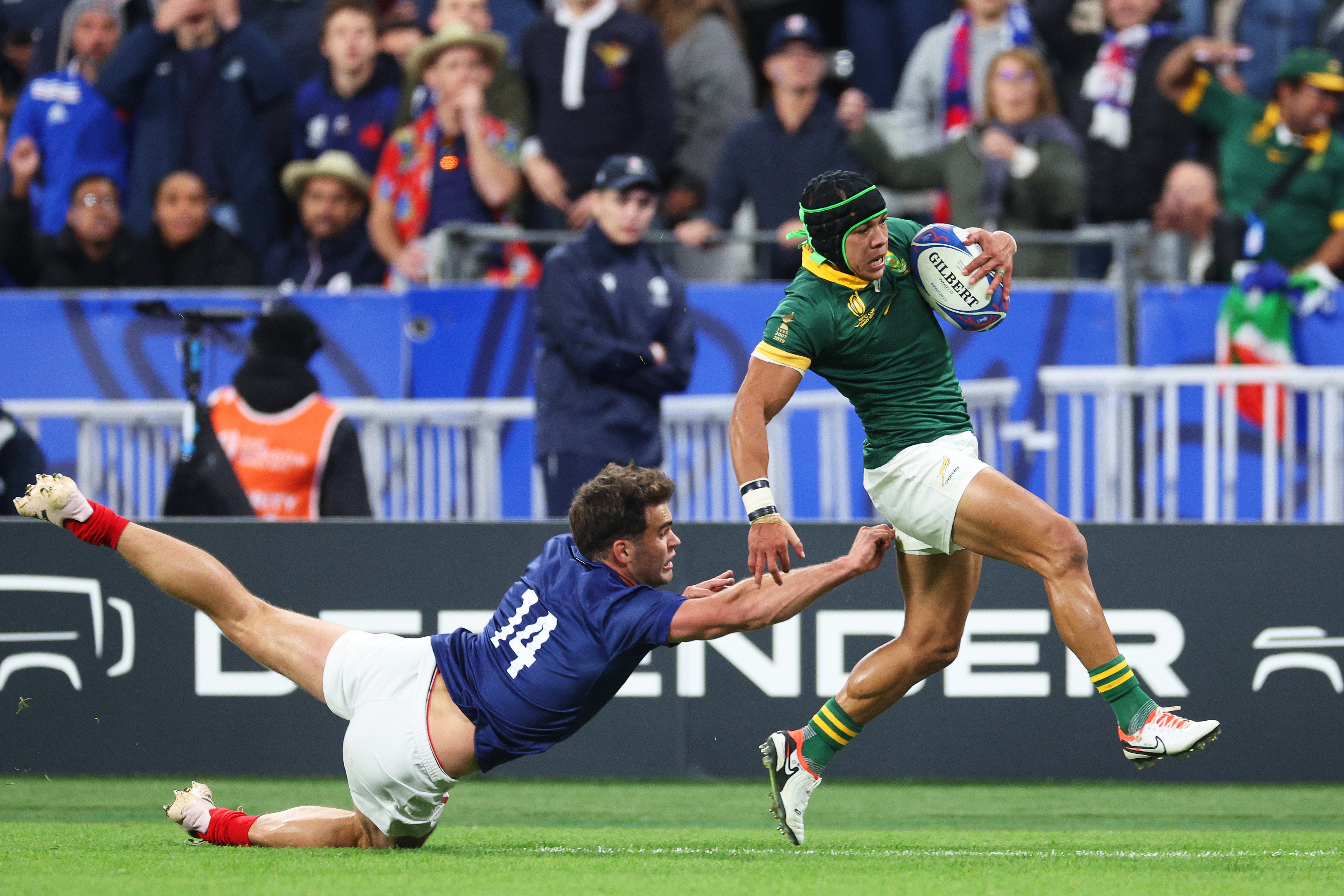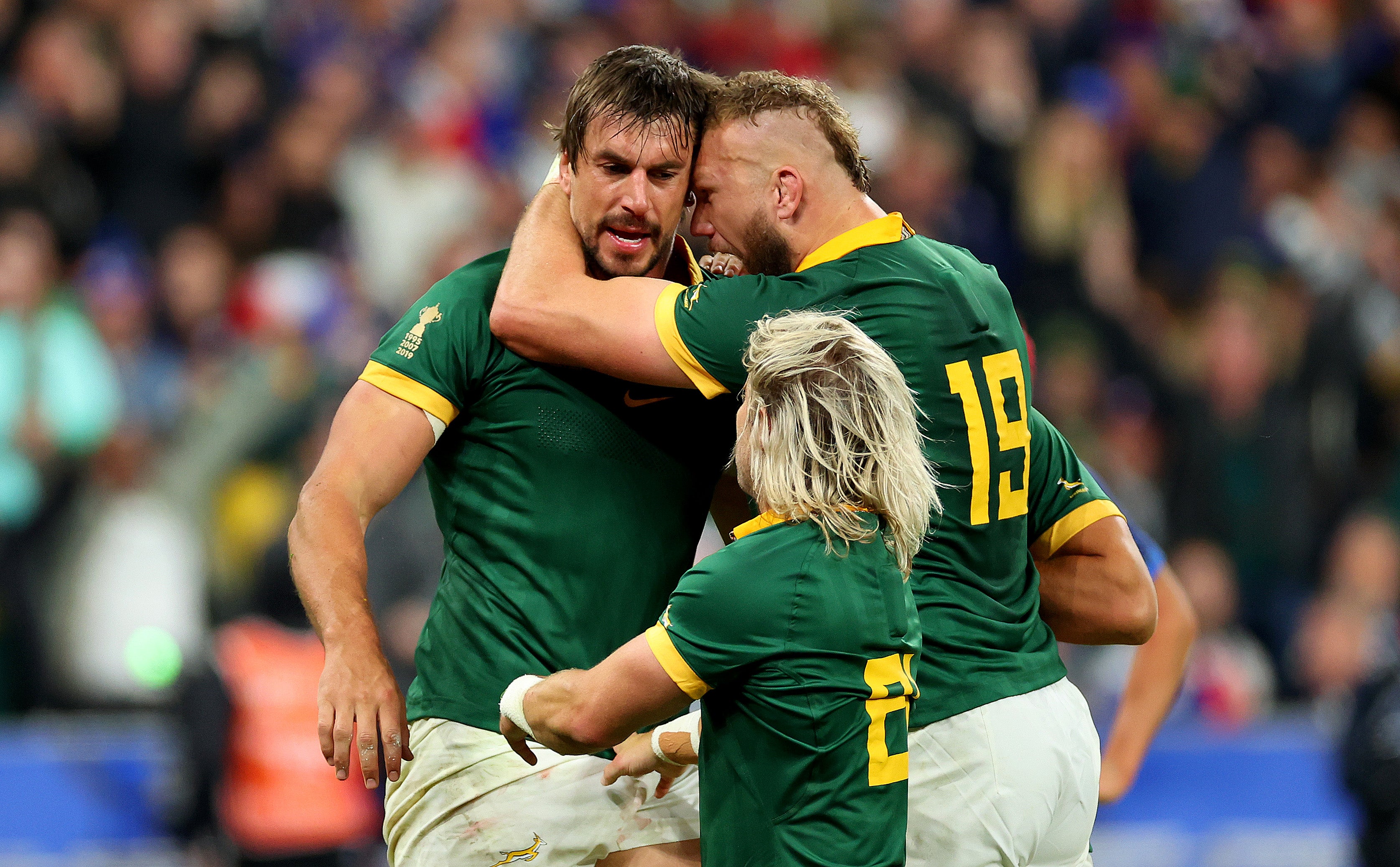France suffer painful symmetry with Ireland as Springboks continue southern dominance
France 28-29 South Africa: Just 24 hours after Ireland endured quarter-final heartbreak in Paris, hosts France followed suit after an epic Rugby World Cup encounter

Your support helps us to tell the story
From reproductive rights to climate change to Big Tech, The Independent is on the ground when the story is developing. Whether it's investigating the financials of Elon Musk's pro-Trump PAC or producing our latest documentary, 'The A Word', which shines a light on the American women fighting for reproductive rights, we know how important it is to parse out the facts from the messaging.
At such a critical moment in US history, we need reporters on the ground. Your donation allows us to keep sending journalists to speak to both sides of the story.
The Independent is trusted by Americans across the entire political spectrum. And unlike many other quality news outlets, we choose not to lock Americans out of our reporting and analysis with paywalls. We believe quality journalism should be available to everyone, paid for by those who can afford it.
Your support makes all the difference.Ireland and New Zealand played out the greatest Rugby World Cup quarter-final of all time, which ended with 37 phases of Irish agony, and yet it took just 24 hours for that game to be bettered by France and South Africa.
It may not have been quite 37 phases, but France’s own final stand – desperately, fruitlessly searching for that decisive score to overcome the inevitable as the clock turns red – ended the same, heartbreaking way. French bodies dropped to the turf in despair, almost exactly mirroring their Irish counterparts from 24 hours earlier, and a southern hemisphere nation celebrated the ongoing World Cup domination over a northern hemisphere titan.
It’s safe to say that no stadium in history has hosted two better games of rugby in the space of one weekend than we’ve been treated to at the Stade de France. It’s also highly likely that no venue has ever witnessed two such incredible occasions, regardless of the sport, in as many days.
The history books will show that the Springboks triumphed 29-28 to seal a semi-final spot but the 80,000 people here will never forget the visceral thrill of watching perhaps as great a match of rugby as it’s possible for there to be. Nor will the majority forget the complete and utter devastation they felt as their home nation heroes came up agonisingly, excruciatingly short on the biggest stage.
Enough has already been written about the lopsided draw at this World Cup – a result of World Rugby inexplicably deciding the groups three years before the tournament – but this quarter-final weekend has truly served to show just how ludicrous the situation is. The Argentina vs Wales and England vs Fiji clashes down in Marseille were compelling in their own way but those four teams may as well have been playing a different sport to what has occurred in Paris.
The breathless tempo, almost unimaginable line-speed and endless moments of world-class quality that Les Bleus and the Springboks served up, especially in a frantic yet controlled first half, were a treat to watch. Those opening 40 minutes, which ended with the hosts 22-19 ahead, may genuinely have been the greatest half of rugby of all time.

The second half may have lacked in scoring but ratcheted up the tension instead and provided a second thrilling finale here in 24 hours. That the trailing team, the crowd favourites, the team that almost all neutrals wanted to triumph once again came up so devastatingly short felt almost unfair.
And for all the suggestions that there has been a power shift in rugby to the northern hemisphere, the Springboks march on to ensure that 75 per cent of the semi-final teams will be from south of the equator. England, of course, are the lone exception. It’s an almost cruel cosmic joke that much-maligned, often-mocked England, who have benefited from a cushy draw and are largely detested by their European neighbours, are the north’s last hope. Perhaps Steve Borthwick’s men can stop the southern tidal wave when they face South Africa next Saturday but the evidence of this weekend suggests that is a forlorn hope.
All the pre-match talk from both sides had been about the physicality and brutality of what lay ahead. Springboks prop Steven Kitshoff warned that “you’re going to have to go to a dark place quite early in this game”, while French flanker Charles Ollivon described playing South Africa as “violent” and returning talisman Antoine Dupont discussed being “willing to suffer to achieve what we want”. Yet while the intensity was certainly at a level rarely reached, even on the grandest stage of a World Cup, it was the special quality and efficiency of both sides that stood out most.
The nervous anticipation that always precedes a do-or-die knockout match meant that, ahead of the game, the in-stadium atmosphere didn’t quite equal the care-free exuberance shown by Les Bleus’ raucous supporters on the opening night against the All Blacks. But it took less than three minutes from the first whistle to get the Stade de France rocking as a monstrous rolling maul from the home side splintered the Springbok pack from the 22 all the way to the line, where a little pop pass to Cyrill Baille saw the prop dive over in the corner for the opening try.

If that was France laying down an early marker, Eben Etzebeth took it upon himself to deliver the South African response. The giant lock is renowned for his brutal physicality, snarling demeanour and intimidatingly confrontational playing style but he demonstrated his athleticism and all-round game to brilliantly read a French pass just metres from the line and tap the ball backwards for an interception turnover. He then chased a high box kick, disrupting it in the air and allowing Kurt-Lee Arendse to seize the loose ball and race away from the defence. Springbok No 10 Manie Libbok’s kicking has come in for justified criticism at this World Cup but he made his own statement by nailing the touchline conversion to level the score.
Libbok then demonstrated his world-class creativity from open play as his pinpoint up-and-under caused havoc in the French ranks. Cameron Woki was the man who this time failed to claim the ball successfully and Damian de Allende raced to within inches of the line before getting back up and crashing over from close range a couple of phases later.
Frighteningly quick ball from rucks was defining France’s play, putting the aggressive Springbok defence on its heels, and this led to a penalty where talisman Dupont – back in the line-up just 24 days after fracturing his cheekbone against Namibia – showed his brawn and his rugby brain. “We’re calm because Antoine’s back,” hooker Peato Mauvaka had said about the No 9’s return ahead of the game and, after somehow wrestling the ball off Siya Kolisi, he took a quick-thinking tap-and-go and threw a wide pass to that man Mauvaka for the equalising try in the corner.
The Springboks hit back, seizing on a loose French pass in midfield, going left and De Allende sliding a pinpoint grubber through for the onrushing Cheslin Kolbe to collect and run over the line but Dupont promptly showed his kicking ability to turn Kolbe around and win a five-metre lineout. From there, a try seemed inevitable and after a few phases off the lineout, Baille burrowed over.
Those of you who had a first-half try double for loosehead prop Cyril Baille on your pre-match bingo card should probably think about doing the lottery this week.

There was still time in this breathless opening 40 minutes for one more crucial moment. Etzebeth went too high while tackling Uini Atonio, making contact with his head, and while he contemplated becoming the first South African to spend 10 minutes in the sin-bin at this World Cup, Thomas Ramos slotted the penalty for a 22-19 half-time lead.
While the second half wasn’t as relentless from a scoring perspective, the tension only grew. The Springboks survived Etzebeth’s absence with no further points and although Ramos then extended the French lead to six from the tee, the Boks eventually turned a long spell of pressure into try number four. It was the ever-present Etzebeth who eventually rumbled over the line, with three defenders hanging off him.
When Handre Pollard – replacing Libbok to bring his superior goal-kicking to bear at the death – added the conversion and then nailed a monster penalty from inside his own half, the Springboks were almost there. But France still had one final stand.
Firstly, Ramos slotted a 72nd-minute three-pointer to narrow the French deficit to just 29-28 and Les Bleus then set about going from their own 22 with just a couple of minutes remaining. They worked their way into opposition territory but, just like Ireland, ultimately ran out of ideas and, after a slightly less harrowing 11 phases, knocked on in contact to end the match.
A stunned Stade de France fell silent, players dropped to the grass in agony and the unwanted symmetry from 24 hours earlier was complete. The northern hemisphere have dominated this World Cup cycle but as we head to semi-final weekend, a New Zealand vs South Africa final feels almost inevitable. France’s greatest chance to win a first World Cup heartbreakingly slips away and now England, a lonely hemisphere turns its eyes to you.



Join our commenting forum
Join thought-provoking conversations, follow other Independent readers and see their replies
Comments